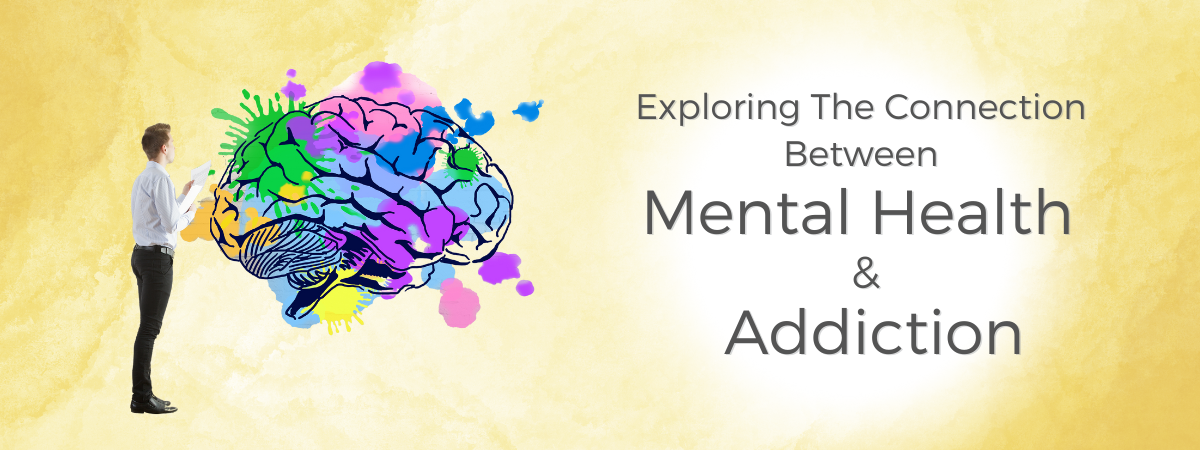

Is There A Connection Between Mental Health And Addiction ?
Have you ever wondered what leads to substance use disorders (SUD)? Knowing the answer could give us the ability to stop and treat these disorders. The good news is, current research is helping us grasp substance use and manage it better. Recent studies have found a strong connection between substance use and mental illness. If you struggle with a SUD, you might also have a co-occurring mental disorder. With this insight, you can seek more effective treatment that addresses both mental health and addiction .
What’s The Connection Between Mental Health And Substance Use ?
In a recent report, the Substance Abuse and Mental Health Services Administration (SAMHSA) determined that around 17 million adults in the US live with both a mental illness and a SUD. They also found that adults and adolescents with mental illnesses were more prone to take habit-forming substances. This evidence reveals a strong connection between mental health and substance use in and all of the nation. But why do mental health disorders prompt substance use?
How Does Mental Illness Lead To Substance Use?
It’s no secret that mental disorders are often challenging to cope with. If not addressed adequately, your disorder can make you feel confused, fearful, angry, and miserable. You could even experience some distressing physiological symptoms. This will happen whether you have been formally diagnosed with a disorder or do not know you have one.
If a mental condition makes your life difficult, it’s understandable you may have felt compelled to consume habit-forming alcohol or drugs to deal with it. The chemicals in these substances leave you feeling temporarily better. They might reduce the agony you feel or initiate a “high” that feels good. When using, you could feel more functional and normal.
When you consume habit-forming substances to manage the symptoms of mental illness, it’s referred to as self-medicating. You could utilize these substances to feel temporarily at ease, more focused, or less troubled. You may also take them to relieve physical pains and discomforts. Self-medication includes utilizing substances not prescribed by a doctor, such as illicit drugs or alcohol, as well as excessive use or misuse prescriptions.
Self-medication usually commences inadvertently. Drinking too much alcohol or excessively using drugs seems like an escape and a method of coping with reality. Regrettably, it’s hard to cease taking something that leaves you feeling better. Your body and mind become reliant on those substances, and you are unable to get by without them. What results is a pattern of self-medication that might spiral beyond your control and cause hazardous and damaging actions.
Grasping the source of your substance use offers a starting point for recovery. Once you understand that mental illness exists at the foundation of your substance use, you can treat both and have a stronger likelihood of recovery.
Can Substance Use Affect Mental Health Too?
The influences of mental illnesses and substance use disorders can be cyclical. The chemicals in dependency-causing substances alter brain chemistry. They can lead to or intensify mental illnesses. The strain of succumbing to addiction might also cause mental conditions like anxiety and depression. As a response, you may turn to alcohol and drugs even more to manage, and the cycle repeats.
Why Manage Mental Health And Addiction At The Same Time?
Dealing with a substance use and mental illness might feel intimidating, even insurmountable. But delving into the cause of your substance use is crucial for lasting recovery. Once you recognize what co-occurring disorder precipitated your drug or alcohol use, you have a solid basis for treatment. Treating mental disorders with therapy and prescription medicine puts you in a better spot mentally for abstaining from addictive substances. Many skills you work on in therapy for handling mental health will assist you in remaining sober, too. You’ll enjoy more success navigating your addiction when you improve any core mental health issues first.
Get Help For Substance Use Disorders And Mental Illness
If you are facing co-occurring addiction and mental health conditions, Evolve Recovery Center is here for you. Our qualified staff are equipped to help you manage the obstacles you encounter with research-backed treatment. Call 888-369-7727 or fill out our contact form to converse with someone immediately about our intake process.
 From the East Coast and beyond, Generation Z has decreased their drinking. What is this drive toward Sober curious, and how will it influence recovery?Read Full Article
From the East Coast and beyond, Generation Z has decreased their drinking. What is this drive toward Sober curious, and how will it influence recovery?Read Full Article What do experts say about virtual substance use treatment? Read and find outRead Full Article
What do experts say about virtual substance use treatment? Read and find outRead Full Article-500x188.jpg?t=1730916637) Don't struggle on your own. Explore the reasons for and signs of drug use disorder and how to attain competent treatment for drug addiction in .Read Full Article
Don't struggle on your own. Explore the reasons for and signs of drug use disorder and how to attain competent treatment for drug addiction in .Read Full Article

